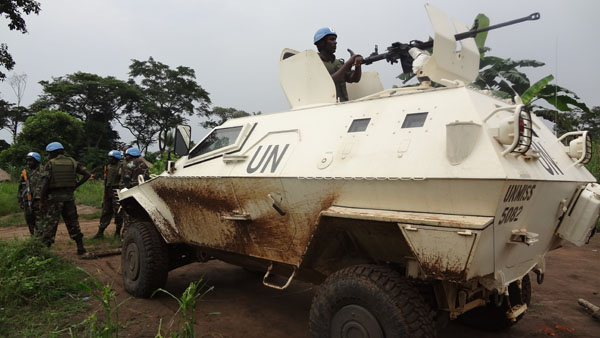
Today, the Enough Project joined a coalition of organizations from central Africa, the U.S., and Europe in releasing a report that assesses the implementation of the U.N. Regional Strategy developed in June to address the Lord’s Resistance Army, or LRA, threat. Nearly six months later, progress to date in implementing the strategy has been minimal, and no clear plans to address the myriad challenges facing the strategy appear to be underway.
The U.N. strategy is comprehensive, encompassing a wide range of critical objectives: enhance regional efforts to apprehend the LRA’s top leaders and protect civilians; encourage LRA rebels to defect; improve the humanitarian response to LRA violence; and promote peacebuilding, human rights, and development in LRA-affected areas. If implemented fully, the strategy could be instrumental in finally and sustainably ending the 25-year-old conflict.
However, progress thus far in implementation has been very limited and slow, and the U.N. has not developed a plan to implement the strategy in its entirety.
There are several impediments that need to be addressed if the strategy is to succeed. These include: the lack of political commitment on the part of the governments of LRA-affected countries; an insufficient number of troops for arresting the LRA’s senior commanders and protecting civilians; the fact that there are no soldiers in many of the areas where the group operates; inadequate real-time intelligence about the LRA; and confusion about who in the LRA will be criminally prosecuted, which is stymying initiatives to promote defections. The strategy is truly at risk of failing, if these and other problems are not resolved.
In particular, the strategy hinges on the full implementation of the African Union’s Regional Cooperation Initiative to end the LRA, which includes the Regional Task Force: a military force that would be composed of 5,000 troops from the LRA-affected countries.
In fact, the A.U. Regional Task Force, or RTF, exists in name only. The armies in the region have technically handed over about 2,800 troops to the A.U., however there are many issues that haven’t been resolved—but need to be in order for the RTF to function. Chief among these are the command and control of the RTF, whether or not the regional governments will get paid for their soldiers, and issues relating to cross-border movements. Add to that the limited political commitment of the governments involved, the distrust among them, the fact that many of the troops that have been handed over are currently inactive, and the reports that the LRA is being harbored in Sudanese-controlled territory and receiving support from Khartoum. The challenges are numerous. Recent reports from the U.N. Group of Experts on the Democratic Republic of Congo about Ugandan government support to the M23 rebellion in eastern Congo further complicate the already very difficult situation.
The U.N., including the secretary-general and Security Council, should be more actively engaged in ensuring that the A.U. and regional governments commit to building an effective regional response.
Moreover, there are many goals outlined in the strategy that the U.N. can make progress on, independent of the A.U. efforts. The U.N. should lead on these fronts.
In order for international donors to support U.N. and regional initiatives to address the LRA conflict, the U.N. should also move quickly to develop clear funding proposals.
Of course, if the strategy is not implemented fully, communities in east and central Africa will continue to face LRA violence and the conflict will remain a threat to regional peace and stability.
The Security Council will meet on December 18 to discuss the LRA and the secretary-general’s upcoming report that outlines progress made on implementing the U.N. strategy.
Photo: U.N. delivers supplies to forces fighting LRA (Enough / Kasper Agger)

